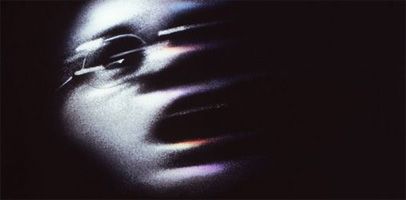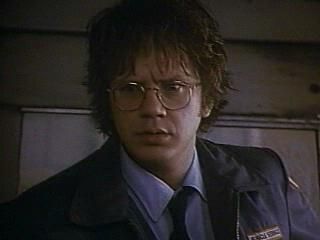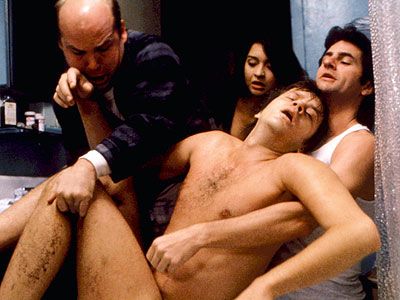One of the most haunting and overlooked films of the 80s, Adrian Lyne’s Jacob’s Ladder is a trip of a movie with a twist ending that it actually earns (I’ll not name the plethora of films guilty of not warranting their surprise finales here). It tells the story of Jacob Singer (Tim Robbins) who, in the opening moments of the picture, gets stabbed in the jungles of Vietnam. The movie then picks up years later to find Jacob as an overworked United States postal worker in New York City. Only the city (while normally depicted as drab and dangerous in most movies) seems more treacherous and strange than ever here. Odd occurrences surround Jacob. The city seems infested by what can only be described as demons. As reality begins to crack around Jacob, his girlfriend Jezebel (Elizabeth Pena) and chiropractor Louis (Danny Aiello) take on polar opposite roles in his world, seemingly in a battle for possession of his soul. The atmosphere grows haunting and turbulent and it’s not until the final moments of the film that everything we’ve seen before finally makes sense. More after the jump:
What eventually adds up to one hell of an emotionally exhausting experience, the film is less a narrative than a descent into hallucinatory madness that vacillates between heavily disquieting heaven and hell imagery. The film’s mood is felt above anything else in the piece, and working from a stellar script by Ghost scribe Bruce Joel Rubin, director Lyne is deftly able to create a sense of perpetual unease and dread rarely seen in most movies. The otherworldly specters and impending violence are more implied through fast cuts and jerky camera movements (that frenzied dancefloor sequence, where Jezebel bangs a demon for Jacob’s viewing pleasure, is particularly standout). The majority of the viscera and gore is left to our imagination. Even the specters themselves, when viewed, aren’t some artificial-looking computer-generated images. The prosthetics add a sense of terror to the film that may not have been as accomplished if actual actors weren’t involved.
Jacob’s Ladder manages to join the elite echelon of respected films that accomplish being a cerebral horror film (which in today’s parlance, means it probably wouldn’t get made). The ghouls and atmosphere are creepy as hell, yes, but there’s also a spiritual side and message to the movie that works without making things too heavy-handed. Because when all is said and done, the movie is about consciousness, sensation and ultimate peace.
PICTURE/SOUND
Like so many movies not filmed in high-def, the images aren’t as brilliant on the blu-ray as other films that are. That said, the graininess level is low throughout the picture and the film’s overall (intentionally) drab and horrific aesthetic is nicely maintained. Picture is certainly clearly and sounds are crisper as well.
EXTRAS
Deleted scenes, trailers, a half-hour long featurette and director’s commentary comprise the supplementals. None of which feels like plain filler (even the theatrical trailer, which opens with a scene of a body moving inside a postal bag in Jacob’s truck. Said creepy-ass moment is cut from the film, but oddly, exists on none of the deleted footage). Director Lyne’s commentary manages to be both understated and comprehensive as the filmmaker guides the audience through his intentions during some of the movie’s more intense sequences. The deleted scenes also manage to add levels of disturbing depths to the picture and it’s interesting to listen to Lyne explain his reasons for excising them from the final cut.
FINAL THOUGHTS
A film that earns its scares, Jacob’s Ladder is emotionally exhausting, viscerally disturbing and very worth seeing. The Blu-ray edition of the film is a technical enhancement (if not in the extras department) in both sound and picture over the Special Edition DVD.



